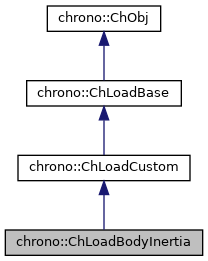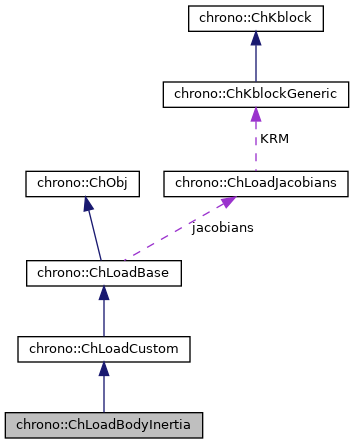Description
Load for adding mass and inertia to a body.
Note that a ChBody already has a mass an inertia tensor, however for speed optimization reasons the ChBody mass is limited to zero offset of center of mass, moreover it does not generate a gyroscopical damping matrix. Therefore, you can use this load if you need:
- an offset between the body and its center of mass
- a gyroscopic damping matrix (and inertial stiffness matrix), ex. it may affect for advanced aeroelastic modal analysis. Note that you must use the solvers for finite elements in order to exploit this feature.
#include <ChLoadsBody.h>


Public Member Functions | |
| ChLoadBodyInertia (std::shared_ptr< ChBody > body, const ChVector<> &m_offset, const double m_mass, const ChVector<> &m_IXX=VNULL, const ChVector<> &m_IXY=VNULL) | |
| virtual ChLoadBodyInertia * | Clone () const override |
| "Virtual" copy constructor (covariant return type). | |
| void | SetInertia (const ChMatrix33<> &newXInertia) |
| Set the inertia tensor of the body, assumed in the body reference basis, with body reference as center. More... | |
| const ChMatrix33 & | GetInertia () const |
| Set the inertia tensor of the body, assumed in the body reference basis, with body reference as center. More... | |
| void | SetInertiaXX (const ChVector<> &iner) |
| Set the diagonal part of the inertia tensor (Ixx, Iyy, Izz values). More... | |
| ChVector | GetInertiaXX () const |
| Get the diagonal part of the inertia tensor (Ixx, Iyy, Izz values). More... | |
| void | SetInertiaXY (const ChVector<> &iner) |
| Set the off-diagonal part of the inertia tensor (Ixy, Ixz, Iyz values). More... | |
| ChVector | GetInertiaXY () const |
| Get the extra-diagonal part of the inertia tensor (Ixy, Ixz, Iyz values). More... | |
| virtual void | ComputeQ (ChState *state_x, ChStateDelta *state_w) override |
| Compute Q, the generalized load. More... | |
| virtual void | ComputeJacobian (ChState *state_x, ChStateDelta *state_w, ChMatrixRef mK, ChMatrixRef mR, ChMatrixRef mM) override |
| For efficiency reasons, do not let the parent class do automatic differentiation to compute the R, K matrices. More... | |
| virtual void | LoadIntLoadResidual_Mv (ChVectorDynamic<> &R, const ChVectorDynamic<> &w, const double c) override |
| Just for efficiency, override the default LoadIntLoadResidual_Mv, because we can do this in a simplified way. More... | |
 Public Member Functions inherited from chrono::ChLoadCustom Public Member Functions inherited from chrono::ChLoadCustom | |
| ChLoadCustom (std::shared_ptr< ChLoadable > mloadable) | |
| virtual int | LoadGet_ndof_x () override |
| Gets the number of DOFs affected by this load (position part) | |
| virtual int | LoadGet_ndof_w () override |
| Gets the number of DOFs affected by this load (speed part) | |
| virtual void | LoadGetStateBlock_x (ChState &mD) override |
| Gets all the current DOFs packed in a single vector (position part) | |
| virtual void | LoadGetStateBlock_w (ChStateDelta &mD) override |
| Gets all the current DOFs packed in a single vector (speed part) | |
| virtual void | LoadStateIncrement (const ChState &x, const ChStateDelta &dw, ChState &x_new) override |
| Increment a packed state (ex. More... | |
| virtual int | LoadGet_field_ncoords () override |
| Number of coordinates in the interpolated field, ex=3 for a tetrahedron finite element or a cable, = 1 for a thermal problem, etc. | |
| virtual void | LoadIntLoadResidual_F (ChVectorDynamic<> &R, double c) override |
| Adds the internal loads Q (pasted at global nodes offsets) into a global vector R, multiplied by a scaling factor c, as R += forces * c. | |
| virtual void | CreateJacobianMatrices () override |
| Create the jacobian loads if needed, and also set the ChVariables referenced by the sparse KRM block. | |
| virtual ChVectorDynamic & | GetQ () |
| Access the generalized load vector Q. | |
 Public Member Functions inherited from chrono::ChLoadBase Public Member Functions inherited from chrono::ChLoadBase | |
| ChLoadJacobians * | GetJacobians () |
| Access the jacobians (if any, i.e. if this is a stiff load) | |
| virtual void | Update (double time) |
| Update: this is called at least at each time step. More... | |
| virtual void | InjectKRMmatrices (ChSystemDescriptor &mdescriptor) |
| Tell to a system descriptor that there are item(s) of type ChKblock in this object (for further passing it to a solver) | |
| virtual void | KRMmatricesLoad (double Kfactor, double Rfactor, double Mfactor) |
| Adds the current stiffness K and damping R and mass M matrices in encapsulated ChKblock item(s), if any. More... | |
 Public Member Functions inherited from chrono::ChObj Public Member Functions inherited from chrono::ChObj | |
| ChObj (const ChObj &other) | |
| int | GetIdentifier () const |
| Gets the numerical identifier of the object. | |
| void | SetIdentifier (int id) |
| Sets the numerical identifier of the object. | |
| double | GetChTime () const |
| Gets the simulation time of this object. | |
| void | SetChTime (double m_time) |
| Sets the simulation time of this object. | |
| const char * | GetName () const |
| Gets the name of the object as C Ascii null-terminated string -for reading only! | |
| void | SetName (const char myname[]) |
| Sets the name of this object, as ascii string. | |
| std::string | GetNameString () const |
| Gets the name of the object as C Ascii null-terminated string. | |
| void | SetNameString (const std::string &myname) |
| Sets the name of this object, as std::string. | |
| void | MFlagsSetAllOFF (int &mflag) |
| void | MFlagsSetAllON (int &mflag) |
| void | MFlagSetON (int &mflag, int mask) |
| void | MFlagSetOFF (int &mflag, int mask) |
| int | MFlagGet (int &mflag, int mask) |
| virtual void | ArchiveOUT (ChArchiveOut &marchive) |
| Method to allow serialization of transient data to archives. | |
| virtual void | ArchiveIN (ChArchiveIn &marchive) |
| Method to allow de-serialization of transient data from archives. | |
| virtual std::string & | ArchiveContainerName () |
Additional Inherited Members | |
 Public Attributes inherited from chrono::ChLoadCustom Public Attributes inherited from chrono::ChLoadCustom | |
| std::shared_ptr< ChLoadable > | loadable |
| ChVectorDynamic | load_Q |
 Protected Attributes inherited from chrono::ChLoadBase Protected Attributes inherited from chrono::ChLoadBase | |
| ChLoadJacobians * | jacobians |
 Protected Attributes inherited from chrono::ChObj Protected Attributes inherited from chrono::ChObj | |
| double | ChTime |
| the time of simulation for the object | |
Constructor & Destructor Documentation
◆ ChLoadBodyInertia()
| chrono::ChLoadBodyInertia::ChLoadBodyInertia | ( | std::shared_ptr< ChBody > | body, |
| const ChVector<> & | m_offset, | ||
| const double | m_mass, | ||
| const ChVector<> & | m_IXX = VNULL, |
||
| const ChVector<> & | m_IXY = VNULL |
||
| ) |
- Parameters
-
body object to apply additional inertia to m_offset offset of the center of mass, in body coordinate system m_mass added mass [kg] m_IXX added diag. inertia values Ixx, Iyy, Izz (in body coordinate system, centered in body) m_IXY added off.diag. inertia values Ixy, Ixz, Iyz including the "-"sign (in body coordinate system, centered in body)
Member Function Documentation
◆ ComputeJacobian()
|
overridevirtual |
For efficiency reasons, do not let the parent class do automatic differentiation to compute the R, K matrices.
Use analytic expressions instead. For example, R is the well known gyroscopic damping matrix. Also, compute the M matrix.
- Parameters
-
state_x state position to evaluate jacobians state_w state speed to evaluate jacobians mK result -dQ/dx mR result -dQ/dv mM result -dQ/da
Reimplemented from chrono::ChLoadCustom.
◆ ComputeQ()
|
overridevirtual |
Compute Q, the generalized load.
In this case, it computes the quadratic (centrifugal, gyroscopic) terms. Signs are negative as Q assumed at right hand side, so Q= -Fgyro -Fcentrifugal Called automatically at each Update(). The M*a term is not added: to this end one could use LoadIntLoadResidual_Mv afterward.
- Parameters
-
state_x state position to evaluate Q state_w state speed to evaluate Q
Implements chrono::ChLoadBase.
◆ GetInertia()
|
inline |
Set the inertia tensor of the body, assumed in the body reference basis, with body reference as center.
The return 3x3 symmetric matrix contains the following values:
[ int{y^2+z^2}dm -int{xy}dm -int{xz}dm ]
[ int{x^2+z^2} -int{yz}dm ]
[ (symm.) int{x^2+y^2}dm ]
◆ GetInertiaXX()
| ChVector chrono::ChLoadBodyInertia::GetInertiaXX | ( | ) | const |
Get the diagonal part of the inertia tensor (Ixx, Iyy, Izz values).
The vector contains these values, assumed in the body reference basis, with body reference as center:
[ int{y^2+z^2}dm int{x^2+z^2} int{x^2+y^2}dm ]
◆ GetInertiaXY()
| ChVector chrono::ChLoadBodyInertia::GetInertiaXY | ( | ) | const |
Get the extra-diagonal part of the inertia tensor (Ixy, Ixz, Iyz values).
The vector contains these values, assumed in the body reference basis, with body reference as center:
[ -int{xy}dm -int{xz}dm -int{yz}dm ]
◆ LoadIntLoadResidual_Mv()
|
overridevirtual |
Just for efficiency, override the default LoadIntLoadResidual_Mv, because we can do this in a simplified way.
- Parameters
-
R result: the R residual, R += c*M*w w the w vector c scaling factor
Reimplemented from chrono::ChLoadCustom.
◆ SetInertia()
| void chrono::ChLoadBodyInertia::SetInertia | ( | const ChMatrix33<> & | newXInertia | ) |
Set the inertia tensor of the body, assumed in the body reference basis, with body reference as center.
The provided 3x3 matrix should be symmetric and contain the inertia tensor as: system:
[ int{y^2+z^2}dm -int{xy}dm -int{xz}dm ]
newXInertia = [ int{x^2+z^2} -int{yz}dm ]
[ (symm.) int{x^2+y^2}dm ]
◆ SetInertiaXX()
| void chrono::ChLoadBodyInertia::SetInertiaXX | ( | const ChVector<> & | iner | ) |
Set the diagonal part of the inertia tensor (Ixx, Iyy, Izz values).
The vector should contain these moments of inertia, assumed in the body reference basis, with body reference as center:
iner = [ int{y^2+z^2}dm int{x^2+z^2} int{x^2+y^2}dm ]
◆ SetInertiaXY()
| void chrono::ChLoadBodyInertia::SetInertiaXY | ( | const ChVector<> & | iner | ) |
Set the off-diagonal part of the inertia tensor (Ixy, Ixz, Iyz values).
The vector contains these values, assumed in the body reference basis, with body reference as center:
iner = [ -int{xy}dm -int{xz}dm -int{yz}dm ]
The documentation for this class was generated from the following files:
- /builds/uwsbel/chrono/src/chrono/physics/ChLoadsBody.h
- /builds/uwsbel/chrono/src/chrono/physics/ChLoadsBody.cpp
